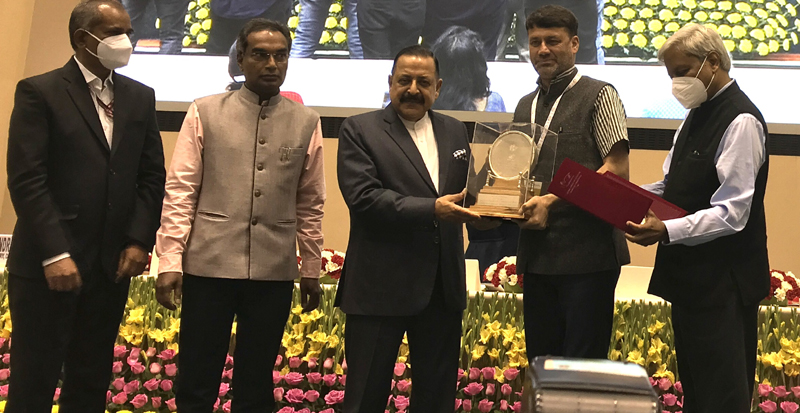
Excelsior Correspondent
NEW DELHI, Feb 28 : While presenting National Science Awards on the occasion of National Science Day today, Union Minister of State (Independent Charge) Science & Technology; Minister of State (Independent Charge) Earth Sciences; MoS PMO, Personnel, Public Grievances, Pensions, Atomic Energy and Space, Dr Jitendra Singh invoked Vision India @2047 and said that mentoring young talent is the best investment for India @2047. He said, young scientists with 25 active years ahead have a crucial role to play in the roadmap for the next 25 years when India celebrates 100 years of independence.
The Minister was speaking at the concluding function of National Science Week on the National Science Day to mark “Vigyan Sarvatra Pujyate”, a pan-India program to celebrate the essence and magnificence of our scientific achievements. He said that the spirit of this one week commemoration of “Vigyan Sarvatra Pujyate” is to celebrate and worship science.
He said it is an opportunity to introspect and look at how we make up for what we did not have. The goal is also to take the science and scientific thinking to the common man, where he can benefit by imbibing scientific information and innovations and hence develop a deeply scientific mind, he added.
Dr Jitendra Singh said, as we celebrate the 75th year of Indian independence, Azadi Ka Amrit Mahotsav, along with freedom fighters, we also want to recall the contribution of Indian scientists such as Mahendralal Sarkar, JC Bose and PC Ray, who struggled to lay the foundation of modern science in India. He added that today India can boast of rapid and transformational changes in sectors like space, atomic energy, renewable, nano-technology, agriculture, digital and IT sector and life sciences under PM Modi.
Dr Jitendra Singh said, India is one of the very few countries that specifically mention science in its constitution. He said, nurturing scientific temper, humanism and a spirit of inquiry and reform is a constitutional duty of every citizen of India.
The Minister said that COVID has taught us all to work together and with an integrated approach and now the challenge is to carry forward this integration. He said that we are now heading into an era where human intervention will become negligible.
Dr Jitendra Singh also presented Science Communication Awards on National Science Day, celebrated every year on 28th February to commemorate the announcement of the discovery of the ‘Raman Effect’ by Sir C.V. Raman, for which he was awarded the Nobel Prize in 1930.
Dr Jitendra Singh released three coffee-table books published by Vigyan Prasar. The first one titled “Department of Science & Technology: Past-Present-Future”, accounts for how DST has been shaped since its inception in 1971 and has shaped the scientific tradition and guided innovation in India. It also provides a glimpse into its future scientific goals.
The second titled “75 under 50: Scientists Shaping Today’s India” explores personal lives and professional accomplishments of 75 scientists, providing an in-depth look at the diversity surrounding them, such as their differing backgrounds, reasons for becoming scientists, obstacles they faced, and their work in different disciplines.
The third book “75 Founders of Modern Science in India” celebrates the 75th year of India’s Independence, that is, Azadi Ka Amrit Mahotsav, by recalling the outstanding contribution of modern Indian scientists in making India a great civilization in the contemporary world.
Another book on Science Cartoon was also released on the occasion.

